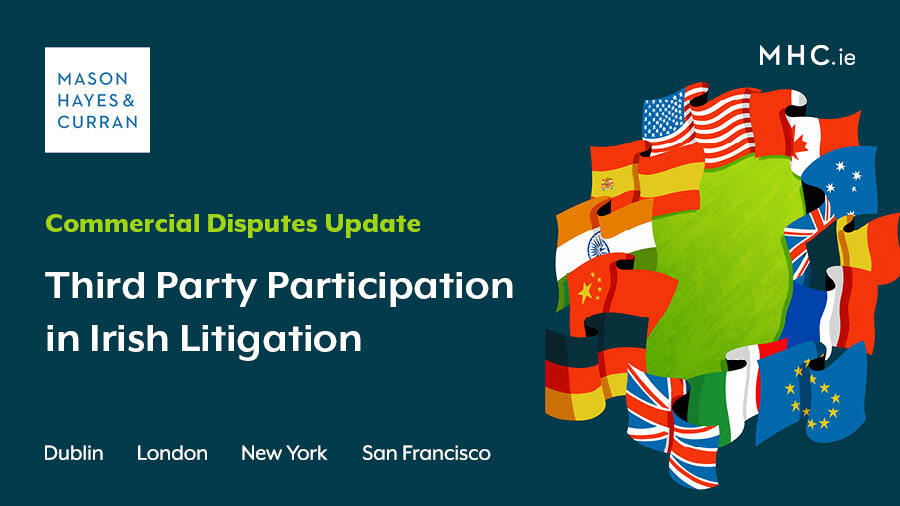
Most litigation involves direct disputes between parties where one seeks relief or compensation against the other following some perceived wrong that has been committed. Typically, the proceedings involve a plaintiff / applicant against a defendant / respondent. However, there may be scope for other parties to participate in the litigation who have an interest in the proceedings but who are not directly connected to the dispute. In Ireland, these third parties may join the proceedings as an ‘amicus curiae’ or a notice party. Commercial Disputes partners, Gearoid Carey and Gerard Kelly explain why and how the status and role of each is different.
Litigation typically involves direct disputes between a plaintiff or applicant who seeks relief or remedies against a defendant or respondent arising from some wrong they have committed. However, depending on the dispute, other parties who are not directly connected to the background of the case may have an interest in the proceedings. Irish procedure allows these parties to join the proceedings as either an ‘amicus curiae’ or a ‘notice party’. However, the status and role of each is different, and not often clearly understood.
Amicus curiae
An amicus curiae is generally understood as being a ‘friend to the court’.
Generally speaking, the role of an amicus is confined to making submissions to the court and is not involved in the finding of facts. The Supreme Court[1] has acknowledged that the courts have an inherent jurisdiction to join amici where they may be of assistance in determining an issue before the court:
“Since the resources of the court itself in this context are necessarily limited, there may be cases in which it would be advantageous to have the written and oral submissions of a party with a bona fide interest in the issue before the court which cannot be characterised as a meddlesome busy body.”
The extent to which the relevant party may be in a position to assist the court will be a significant factor in determining whether to join an amicus to proceedings. As explained in O’Brien v PIAB[2], “the court will appoint an amicus only where it is satisfied that that putative party will be in a position to assist the court in respect of the legal issues which arise within the scope of the proceedings as defined by the parties, often by availing of the peculiar expertise or insight at its disposal.” In simple terms, this means that an amicus should have an expertise that will assist the court. The Supreme Court[3] has also stressed that the “fundamental question to be addressed in each case is whether the Court is likely to be assisted significantly by the intervention offered.”
Although a position of neutrality will generally ensure a party is better placed to be joined as an amicus, being partisan will not necessarily disqualify them from being joined as an amicus.[4] This is reflected in Data Protection Commissioner v Facebook Ireland Ltd [5] where Judge McGovern observed that the courts had become more willing to join amici who had a strong view or vested interest.
That decision also demonstrated that not all applicants will prevail. Here, nine separate parties sought to be joined as amici to those proceedings at an early stage, but only four were successful. As has been recognised, the jurisdiction to join an amicus curiae is one which should be “sparingly exercised”, especially at the trial stage.[6] Where the proposed amicus has expertise through a public function or official recognition regarding a certain issue, this also tends to favour being joined. This is especially relevant where the case involves questions of public law with implications for the general public.
Although the joinder of an amicus was traditionally understood usually to be more appropriate before appeal courts, it has also been accepted that joinder may be appropriate at the trial stage of proceedings.[7] Any party seeking to be joined as an amicus must apply formally to court on notice to the other parties. The court will also consider the attitude of those other parties before the ultimate decision is made.[8]
Notice party
In contrast to an amicus, the very basis for a notice party’s participation in proceedings is because they are ‘directly affected’ by the outcome.[9] The position has been summarised that “where a party has a "vital interest in the outcome of the matter" or is "vitally interested in the outcome of the proceedings" or would be "very clearly affected by the result" of the proceedings, it is appropriate for that party to be a notice party in the proceedings.”[10]
However, a distinction must be drawn between an interest in proceedings which are purely civil and private, and those which concern issues of public law. The Supreme Court has recognised that in “civil litigation, generally speaking, parties are allowed to choose whom they wish to sue. In matters of public law persons other than the public authority may have a real and substantial interest in the outcome.”[11] There is also a distinction to be drawn between a member of the public who has a general interest in the proceedings and a person who has a genuine individual interest which would warrant their participation as a notice party. For example, a party unsuccessful in a tender may bring proceedings against the awarding entity and the successful tenderer could be a notice party. Although a member of the public may be personally impacted by the service being tendered for as a consumer, they do not have same right to participate in proceedings regarding the tender.
It may be that in commencing proceedings, judicial review proceedings especially, the applicant will include those directly affected as notice parties to the proceedings. The tender example above is one where the successful tenderer would likely be joined.
However, if a party believes they should be entitled to participate as a notice party, the proposed notice party must show that they have a “vital interest” in the outcome. They must also show that they are “directly affected” by the outcome of the proceedings. For example,[12] if a decision of a regulator is challenged, the outcome of that challenge may affect a specific individual entity, i.e. the person or body who the decision concerns. It is the person who the decision affects that has an entitlement to be joined as a notice party to the proceedings, rather than the public at large, who may have a general interest in the outcome of the proceedings.
An application to be joined as a notice party can be made at any stage of the proceedings, even after an appeal has been taken. More conventionally, however, the application will be brought before the trial stage. This is done by way of motion on notice to the existing parties.
Conclusion
The status and role of an amicus and notice party does differ materially. Although an amicus may have a vested interest in the outcome of the proceedings, they do not need to join as a party. In addition, their participation is limited to making submissions to the court on the issues which have been presented by the other parties. Typically, the amicus will also bear their own costs of participating in the proceedings and are not at risk of costs orders being made against them.
By contrast, a notice party’s participation arises because they are directly affected by the outcome. Typically, there will be a public law element to the proceedings and they will have a genuine individual interest in the outcome. That will not just be a general interest in common with members of the public at large. Notice parties also enjoy full participation rights in the proceedings. These include participation in findings of fact, as well as legal submissions. Although notice parties usually bear their own costs of participating, the more involved a notice party becomes in the proceedings, the greater their exposure is in terms of costs. This is because orders for costs can be made against notice parties.
For more information and expert advice on commercial disputes, contact a member of our Commercial Disputes team.
The content of this article is provided for information purposes only and does not constitute legal or other advice.
[1] I v Minister for Justice, Equality and Law Reform [2003] 3 IR 197
[2] [2005] 3 IR 328
[3] IRM v Minster for Justice and Equality [2018] IESC 7
[4] Fitzpatrick v FK [2007] 2 IR 406
[5] [2016] IEHC 414
[6] EMI Records (Ireland) Ltd v UPC Communications Ireland Ltd [2013] IEHC 204
[7] See Fitzpatrick v FK [2007] 2 IR 406, Data Protection Commissioner v Facebook Ireland Ltd. [2016] IEHC 414
[8] Schrems v Data Protection Commissioner [2014] IEHC 351
[9] As reflected by Order 84, Rule 22(2) of the Rules of the Superior Courts
[10] BUPA Ireland v Health Insurance Authority (No.1) [2006] 4 IR 201
[11] Dowling v Minister for Finance [2013] IESC 58
[12] And as explained by Judge Clarke in Yap v Children’s University Hospital Temple Street Ltd. [2006] 4 IR 298
Share this:





